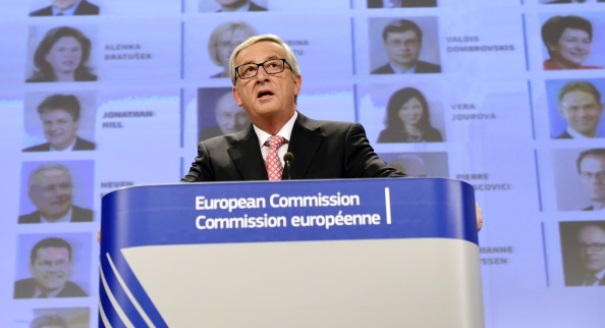Incoming European Commission president Jean-Claude Juncker’s first words on announcing the members of his new commission were about jobs and growth. Enlargement and the EU’s neighbors are second rank.
Putting Europe “back on the path to jobs and growth” was Juncker’s pledge as he unveiled a team that breaks with tradition. He had already promised an emphasis on employment during the campaign for May’s European Parliament elections. As an EU veteran, the former Luxembourgian prime minister is under pressure to deliver.
Juncker’s 28-member commission will have seven vice presidents, including the EU’s new foreign policy chief, Federica Mogherini. (The previous commission had eight vice presidents.) Each will lead a project team and will “steer and coordinate” the work of the other 20 commissioners. Let’s hope that really happens.
One wonders if Juncker’s new structure is aimed at cutting out the bureaucratic heaviness of the commission so he can deal directly with the vice presidents and get things done faster. Whatever the reason for the rejigging, power struggles cannot be ruled out.
That aside, there are dossiers that really do matter for the EU’s standing in the world. These include trade, competition, the internal market, energy, the environment, and EU enlargement.
Juncker chose to put the Euroskeptic Briton Jonathan Hill in charge of the new portfolio of financial stability, financial services, and the capital markets union. That decision must surely be an attempt to offer something to London, which dominates financial services in the EU, before Scotland votes on independence on September 18.
Following that referendum, British Prime Minister David Cameron intends to hold a vote in 2017 on whether the UK should remain in the EU—assuming the union still exists then and Cameron is still prime minister.
France gets a big commission post, too. The former finance minister Pierre Moscovici takes over economic and financial affairs, taxation, and customs. Budgetary discipline is in short supply in French President François Hollande’s left-wing government, so it will be interesting to see what stance Moscovici takes vis-à-vis Hollande’s failure to tackle France’s inflexible labor markets.
As for Germany, now that’s really interesting. Those inside the Brussels bubble had expected the previous energy commissioner, Germany’s Günther Oettinger, to get the trade portfolio and be responsible for the talks on the crucial Transatlantic Trade and Investment Partnership. Instead, he was landed with the digital economy and society. That must be a letdown for him.
German Chancellor Angela Merkel may have had a hand in this appointment. She had sent Oettinger to Brussels five years ago in the belief that Berlin, not he (meaning Brussels), would call the shots over EU energy policy. In the end, by all accounts, he became his own man over energy matters.
That portfolio—in the form of the proposed EU energy union—passes to one of the commission vice presidents, Alenka Bratušek. Currently prime minister of Slovenia, her political skills have yet to be tested at EU level. In its press release announcing the new lineup, the commission said that Europe must “stand on its own feet when it comes to energy security.”
Poland and the Baltic states are sure to be disappointed that they did not get that dossier, given their dependence on Russian energy and criticism of Moscow’s wholesale military interference in Ukraine.
But Poland hasn’t many grounds for complaint. Donald Tusk announced his resignation as Poland’s prime minister on September 9 to take up his new role as president of the European Council on December 1. The person once tipped to be his successor as prime minister, Elżbieta Bieńkowski, becomes European commissioner for the internal market, another important post.
For those looking in from outside the EU, the appointments must be perplexing, to say the least.
Johannes Hahn, an Austrian who was in charge of regional policy in the previous commission, will now be responsible for the European Neighborhood Policy and enlargement negotiations. According to the commission, this portfolio, “next to a reinforced neighborhood policy, puts the focus on the continuation of enlargement negotiations, whilst acknowledging that there will be no enlargement of the European Union for the next five years.”
A freeze on EU enlargement might not be a bad thing, provided the perspective of joining the EU remains an option. That pause might allow Juncker, who by inclination is an integrationist and someone who has seen the stabilizing effects of enlargement, to shift public opinion, which has become increasingly opposed to a bigger EU. In the meantime, Hahn is “going home,” so to speak: Vienna’s diplomats understand the Western Balkans and Eastern Europe.
As ever with EU appointments, much will depend on the teams who will support the commissioners. But the big question is the role the EU’s new foreign policy chief will play. Italy’s outgoing foreign minister, Federica Mogherini, takes over that job from Catherine Ashton on November 1.
With Juncker focused on jobs, growth, and the future of the euro, this could be a chance for Mogherini to give the EU the strategic direction and focus it sorely needs. If not, the EU can forget about being a real foreign policy player.


.jpg)
.jpg)


